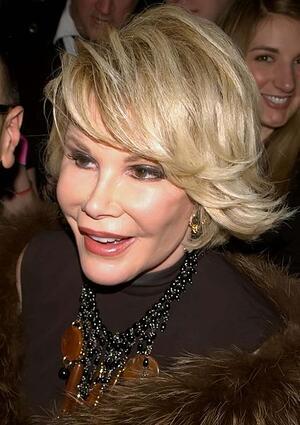Opening of Joan Rivers' first Broadway play
Joan Rivers at Musto's 25th Anniversary, New York City, 2010.
Courtesy of David Shankbone/Wikimedia.
Joan Rivers' first Broadway play, Fun City, opened on January 2, 1972. Though a New York Times critic panned the production as "frenetic to the point of being frazzled," the same reviewer praised Rivers as "a deft comedy writer" and "a very funny lady." Although Fun City, which Rivers both co-wrote and starred in, met with only tepid success, Rivers went on to make an indelible mark on American comedy.
Born in Brooklyn on June 8, 1933, and raised by Russian Jewish immigrants, Rivers was educated at Barnard College, where she earned a B.A. in English, Phi Beta Kappa, in 1954. Rivers aspired to a career in theater from a young age. Defying the wishes of her mother and father, who wanted Rivers to marry and settle down in "polite society," Rivers worked as an office temp after college while auditioning for Off- and Off-Off-Broadway plays. She got her first big break in 1961, when she joined the Second City Comedy troupe of Chicago.
Within a few years, Rivers built on her success with Second City to become a regular in New York City comedy clubs. She also wrote comedy scripts for others, including for the Phyllis Diller Show and Candid Camera. In 1965, she was introduced to a national audience in a dialogue with Johnny Carson on Carson's Tonight Show, where she also became a writer. Rivers's act was marked by a combination of unsettling frankness and an unthreatening ingénue image. She adopted the monologue style of male comedians, but used it to challenge social conventions. She was, for instance, among the first mainstream comedians to talk frankly about sex, which she did with a sharp wit that both shocked and endeared her to audiences.
In the 1970s, Rivers branched out into new media. After the mixed reaction to Fun City, her 1973 comic TV movie The Girl Most Likely To was the most successful made-for-TV movie of its time. Two books, Having a Baby Can Be a Scream (1975) and The Life and Times of Heidi Abramowitz (1984) were also great successes. While Rivers served as a permanent guest host for Johnny Carson from 1983 through 1986, her own attempted late-night television program on Fox, The Late Show Starring Joan Rivers, was a failure. The 1990s saw Rivers addressing more serious themes. In the NBC movie Tears and Laughter, in which Rivers played herself, and a Broadway play, Sally Marr and Her Escorts (both 1994), she addressed the price that artists pay for their celebrity. Tears and Laughter addresses the suicide of Rivers' husband, producer Edgar Rosenberg, while Sally Marr is based on the life of Lenny Bruce's mother. Rivers remained active as a comedian until her death in 2014, often promoting her own line of jewelry on the QVC cable network, and serving as an occasional fashion commentator with her daughter Melissa.
Rivers is profiled in Making Trouble: Three Generations of Funny Jewish Women (2007), a documentary produced by the Jewish Women's Archive.
Sources: Jewish Women in America: An Historical Encyclopedia, pp. 1154-1156; New York Times, January 3, 1972; Joan Rivers, Enter Talking (New York, 1986) and Still Talking (New York, 1991); Susan Blacher Cohen, Jewish Wry: Essays on Jewish Humor (Bloomington, IN, 1987); www.joanrivers.com/AllAboutJoan/; Making Trouble - www.makingtrouble.com.



